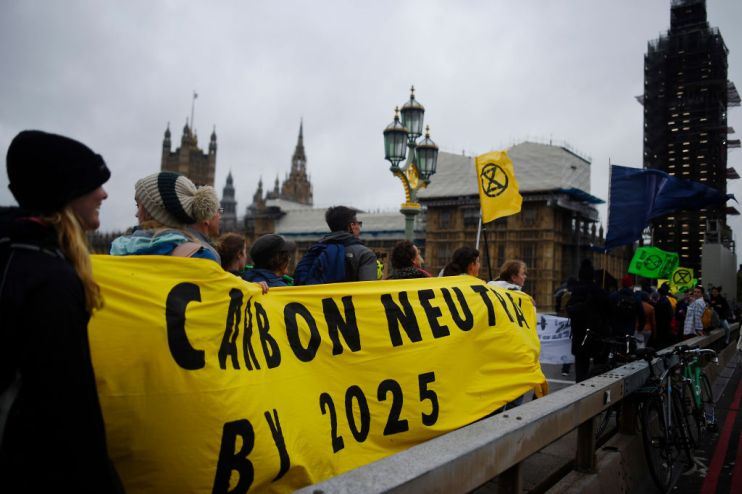It’s the end of the world as we know it… do we feel fine?

No-one who lives in London would be able to miss at least some news content about the Extinction Rebellion demonstrations in the capital this week. Seemingly the protestors have been everywhere: on Monday, they blocked Westminster Bridge and barricaded one end of Whitehall with a hearse, and on Tuesday they glued themselves to the Department for Transport and occupied Smithfield meat market. And so, the defiant acts of rebellion against authority have continued. They’ve caught the public’s attention. But are they doing themselves any good?
There’s no doubt that climate change is now firmly fixed near the top of the political agenda, and it has particularly caught the imagination of young people, who are otherwise unengaged in traditional politics and, rightly or wrongly, feel somewhat disenfranchised. Greta Thunberg is now an international icon and there is talk of a Nobel Peace Prize (hyperbole? Maybe not). On the Left, particularly, there is a firm identification of green politics in opposition to the blustering nationalism of Donald Trump, Viktor Orban, Matteo Salvini and others. Battle lines are being drawn. I’m not wholly sure, however, that Extinction Rebellion are winning the propaganda war. Their strategy seems to be designed to please their existing supporters and confirm the bias of those who agree with them anyway. The wider public are, I sense, a little more apathetic towards their high-profile stunts.
It is a fundamental truth, but one which activists seem unable to grasp, that in London and other major cities, causing traffic chaos and gridlock, disrupting traffic and shutting down public transport, is PR poison. Next time you’re on your way to work, on the Tube platform or in a bus queue, look at your fellow commuters. How do they look? Joyful, enthused, interested, open to debate? No. they’re weary, impatient and often sullen. They want to get to work as quickly as possible to do a day’s graft for a day’s pay, then leave in the evening. Who can blame them? If you make things difficult for them in that quest, the overwhelming likelihood is, I believe, that they will frown at you, disapprove, and turn away from your message. “Sure, the environment is important,” they’ll think, “but I can’t save it today. I just want to get to the office.” Round one of the match is already lost.
Then consider the image of the protestors. It’s easy to mock and caricature them, but they hardly help themselves. When they blocked off Westminster Bridge on Monday, what did they do with the reclaimed urban space? They held yoga classes. There was a same-sex wedding ceremony. The demonstrations have drawn the very visible support of theatre giants Sir Mark Rylance and Juliet Stevenson. If a right-wing satirist had wanted to paint a more leftist, Establishment, bien pensant image, he or she would have struggled to better reality.
I’m no advocate for Boris Johnson, his politics or his style of government, but when he dismissed the protestors as “uncooperative crusties”, I have no doubt that the accusation will have struck home, especially with older, more conservative voters. People who remember the anti-road protests of the early 1990s, to whom the name “Swampy” still means something, will have nodded in sad agreement. These, they will have thought, are privileged obsessives, who have the leisure time to protest during the working week and can’t see beyond the end of their dreadlocks. They are professional agitators, Boris’s listeners will have judged, who move from one site to another, adopting any cause which is championed by The Guardian, and which seems in their simplistic analysis to be vaguely anti-capitalist. That’s the message.
It’s not that I agree. I know as much as the next reasonably well-informed man or woman that climate change is an existential threat not only to our way of life but our existence. It’s one of the reasons I’ve been a vegan for many years now and I encourage others to embrace the habit as well. But I work in communications, and I can read messages, spoken and unspoken. I think Extinction Rebellion have opened themselves too easily to dismissal and parody. They have done outrageous things which will irritate and annoy, they have courted ‘the usual suspects’ for celebrity endorsements, and they have pitched their activities and their methods at their existing support base. They have shown no inclination to reach across the literal barricades they have built and engage with opponents or even the disinterested majority.
Battle lines have been drawn, daubed in the fake blood which ran down Whitehall last week. The spirit of compromise seems nowhere to be embraced. Extinction Rebellion are taking a stand, and they have certainly got themselves noticed and boosted their media profile, but they shouldn’t imagine that it is uncritical. On balance, in PR terms, I think this week has been at best a score draw for them – but, if I’m honest, really honest, I think it’s been an own goal. Maybe they should have reached out, and asked a professional.